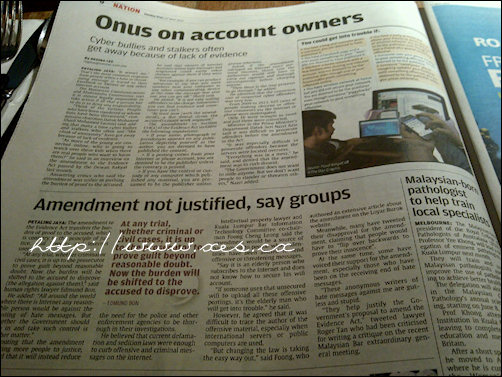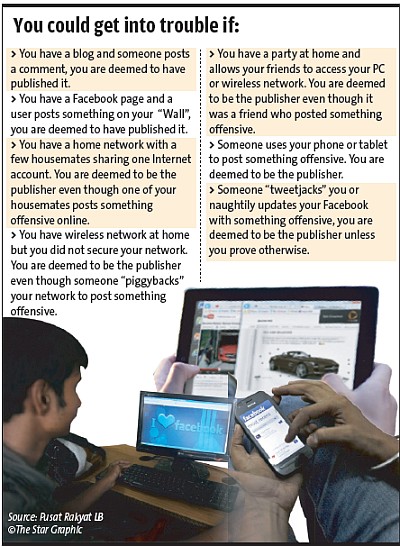Subsequent to my LoyarBurok article and feature in The Sun Daily, I was interviewed by The Star newspaper regarding my disapproval to the new evidence amendment act. A short quote was featured in The Star’s article entitled Amendment not justified, say groups. The full article can be read below.
When I was interviewed on the phone, the reporter said that someone may be listening to our conversation. I hope it’s not true.

PETALING JAYA: The amendment to the Evidence Act transfers the burden of proof to the accused, which is contrary to the principle of justice, said lawyers and Internet users.
“At any trial, whether criminal or civil cases, it is up to the prosecutor to prove guilt beyond reasonable doubt. Now the burden will be shifted to the accused to disprove (the allegation against them),” said human rights lawyer Edmund Bon.
He added: “All around the world where there is Internet any reasonable person would be against the posting of hate messages. But whether the Government should step in and take such control is another matter.”
Disputing that the amendment will bring more people to justice, Bon said that it will instead reduce the need for the police and other enforcement agencies to be thorough in their investigations.
He believed that current defamation and sedition laws were enough to curb offensive and criminal messages on the Internet.
Intellectual property lawyer and Kuala Lumpur Bar Information Technology Committee co-chairman Foong Cheng Leong said the amendment would be a source of harassment to people whose identities have been abused to send offensive or threatening messages.
“Say it is an elderly person who subscribes to the Internet and does not know how to secure his wifi account.
“If someone uses that unsecured wifi to upload all these offensive postings, it’s the elderly man who will get into trouble,” he said.
However, he agreed that it was difficult to trace the author of the offensive material, especially when international servers or public computers are used.
“But changing the law is taking the easy way out,” said Foong, who authored an extensive article about the amendment on the Loyar Burok website.
Meanwhile, many have tweeted their disapproval for the amendment, claiming that people would have to “flip over backwards to prove their innocence”.
At the same time, some have voiced their support for the amendment, especially those who have been on the receiving end of hate messages.
“These anonymous writers of hate messages against me are gutless and stupid.
“They help justify the Government’s proposal to amend the Evidence Act,” tweeted lawyer Roger Tan who had been criticised for writing a critique on the recent Malaysian Bar extraordinary general meeting.
You should also read the article below. The table below is a reproduction of a part of my LoyarBurok article.
Cyber bullies and stalkers often get away because of lack of evidence
By REGINA LEE
regina@thestar.com.myPETALING JAYA: “It wasn’t me.” That’s the most common response from people when a hate or threatening message is traced to their Facebook or Twitter or any other Internet account.
The Malaysian Communications and Multimedia Commission says it is almost legally impossible to take action if all that a person has to do is to deny any responsibility.
“Think of the victims. People who have been slandered or whose lives have been threatened,” commission chairman Datuk Mohamed Sharil Mohamed Tarmizi said, adding that many a time cyber bullies and stalkers who often use “the cloak of anonymity” have got away because of lack of evidence.
“As more of the young are connected online, who is going to watch over these kids when there are real people who want to harm them?” he said in an interview on the amendment to the Evidence Act passed by the Dewan Rakyat last month.
Answering critics who said the amendment was unfair in pushing the burden of proof to the accused, he said that owners of Internet accounts where hate messages had originated could easily rebut charges against them if they were innocent.
“For example, if you can produce witnesses to say that you were nowhere near your computer or any other communicating device at the time the message was sent out, you can get off,” Sharil said.
He added: “It is not easy nailing offenders to the charge. Sometimes you can find evidence and sometimes you can’t.
“At least now (with the amendment), a flat denial (from the accused) cannot work anymore.”
The amendment to Section 114(a) of the Evidence Act includes the following stipulations:
> If your name, photograph or pseudonym appears on any publication depicting yourself as the author, you are deemed to have published the content.
> If a posting comes from your Internet or phone account, you are deemed to be the publisher unless the contrary is proved.
> If you have the control or custody of any computer which published any material, you are presumed to be the publisher unless proven otherwise.
Asked if the amendment infringed on Internet users’ personal liberties, Sharil said the authorities would still have to carry out rigorous and thorough investigations before charging anyone.
“Then there is the trial processs to go through,” he added.
He admitted that the conviction rate of suspected cyber offenders was very low.
From 2009 to 2011, 625 cases of people making obscene or offensive comments via the Internet or phone were investigated.
Only 16 were brought to court and just three were convicted.
Minister in the Prime Minister’s Department Datuk Seri Nazri Aziz said it was difficult to prosecute offenders before the amendment to the Act.
“It was especially difficult to prosecute offenders because the servers were located overseas.
“Everything was in a mess,” he said, and denied that the amendment was to curb dissent.
“The Government does not want to stifle anyone. But we don’t want people to slander or threaten others,” Nazri added.
Related Story:
Cyber bullies and stalkers often get away because of lack of evidence
